
Stanisław Herman Lem was a Polish writer of science fiction, and essays on various subjects, including philosophy, futurology, and literary criticism, also known for satire and humor in his works. Lem's books have been translated into 41 languages and have sold over 45 million copies. From the 1950s to 2000s, he published many books, both science fiction and philosophical/futurological. Worldwide, he is best known as the author of the 1961 novel Solaris, which has been made into a feature film three times. In 1976, Theodore Sturgeon wrote that Lem was the most widely read science fiction writer in the world. The total print of Lem's books is over 30 million copies.

Solaris is a 1961 philosophical science fiction novel by Polish writer Stanisław Lem. Its central theme is the complete failure of human beings to understand an extraterrestrial intelligence.

Philip Reeve is a British author and illustrator of children's books, primarily known for the 2001 book Mortal Engines and its sequels. His 2007 novel, Here Lies Arthur, based on the legendary King Arthur, won the Carnegie Medal, which sets out to choose the year's best children's book published in the UK.

Michael Kandel is an American translator and author of science fiction.
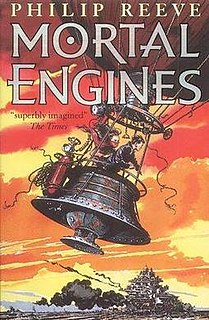
Mortal Engines is a young-adult science fantasy novel by Philip Reeve, published by Scholastic UK in 2001. The book focuses on a futuristic, steampunk version of London, now a giant machine striving to survive on a world running out of resources.
Hester Shaw, later known as Hester Natsworthy, is the lead heroine of Philip Reeve's Mortal Engines Quartet trilogy.
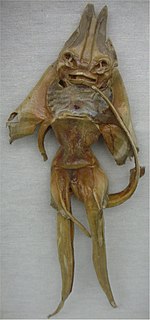
A Jenny Haniver is the carcass of a ray or a skate that has been modified by hand then dried, resulting in a mummified specimen intended to resemble a fanciful fictional creature, such as a demon or dragon.

The Mortal Engines Quartet also known as the Predator Cities Quartet is a series of epic young adult fantasy novels by the British novelist and illustrator Philip Reeve. He began the first volume of the series, Mortal Engines, in the 1980s, and it was published in 2001. Reeve then published three further novels, Predator's Gold in 2003, Infernal Devices in 2005, and A Darkling Plain in 2006. The series is set thousands of years in the future in a time known as the Traction Era, and tell the story of two young adventurers on a desolate planet Earth where moving cities roam for resources, eating each other. The novels have won a number of awards, including the Nestlé Smarties Book Prize in 2002 for Mortal Engines and the 2006 Guardian Children's Fiction Prize and the 2007 Los Angeles Times Book Prize for Young Adult Fiction for A Darkling Plain.
The Jenny Haniver is a fictional airship in Philip Reeve's Mortal Engines Quartet.
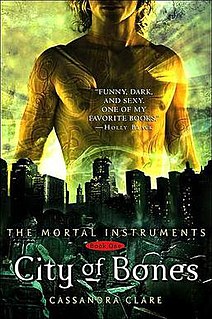
City of Bones is the first urban fantasy book in author Cassandra Clare's New York Times bestselling series The Mortal Instruments. The novel is set in modern-day New York City and has been released in several languages, including Bulgarian, Hebrew, Polish and Japanese.
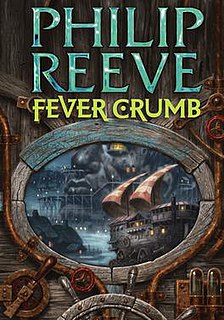
Fever Crumb is a young adult post-apocalyptic science fiction novel by Philip Reeve, published in 2009. The first in a series, it is followed by A Web of Air in 2010 and Scrivener's Moon in 2011. The books of the Fever Crumb series are prequels to the Mortal Engines Quartet series of novels by the same author.
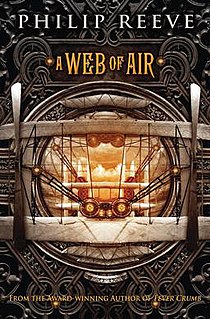
A Web of Air is a young adult post-apocalyptic science fiction novel by Philip Reeve. It is the second book in the Fever Crumb prequel series to Mortal Engines Quartet. It was published on 5 April 2010.
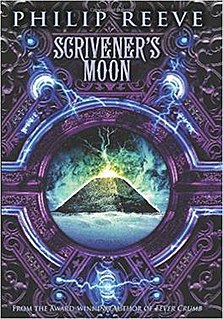
Scrivener's Moon is the sequel to A Web of Air, and the third book in the Fever Crumb trilogy, the prequel series to Mortal Engines Quartet. It was released on 4 April 2011.

Fables for Robots is a series of humorous science fiction short stories by Polish writer Stanisław Lem, first printed in 1964.

Mortal Engines is a 2018 post-apocalyptic action adventure film directed by Christian Rivers and with a screenplay by Fran Walsh, Philippa Boyens, and Peter Jackson, based on the 2001 novel of the same name by Philip Reeve, and starring Hera Hilmar, Robert Sheehan, Hugo Weaving, Jihae, Ronan Raftery, Leila George, Patrick Malahide, and Stephen Lang. An American–New Zealand co-production, the film is set in a post-apocalyptic world where entire cities have been mounted on wheels and motorised, and practice municipal Darwinism; its movie universe is different from that of the books.
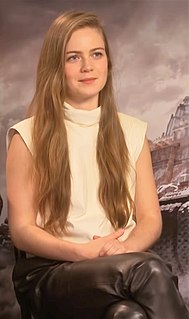
Hera Hilmarsdóttir is an Icelandic actress. She was the lead actress in the 2018 film Mortal Engines. Other notable roles are Vanessa in the television series Da Vinci's Demons and Eik in the Icelandic film Life in a Fishbowl.

The Mask is a science fiction techno horror short story by Polish writer Stanisław Lem written in 1974 and first published in literary magazine Kultura that year. It was the title story in a short story collection published in 1976 by Wydawnictwo Literackie. It is a story of an assassin android she-robot programmed both to love and to kill its human target and who gradually becomes aware of herself and her programming.
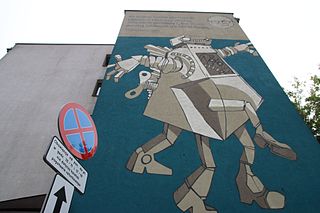
Robots of Stanisław Lem are best known from writer's series Fables for Robots (1964), written in the grotesque form of folk fairy tales, set in the universe populated by robots. In this universe there are robot kings, robot peasants, robot knights, robot scientists; a robot damsel in distress is pestered by a robot dragon, robot dogs have robot fleas, etc. The collection The Cyberiad (1965) belongs to the same grotesque cross-genre of fairy tale and science fiction. Its main protagonists are robots-"constructors" Trurl and Klapaucius, who are something of both sorcerers and engineers.















